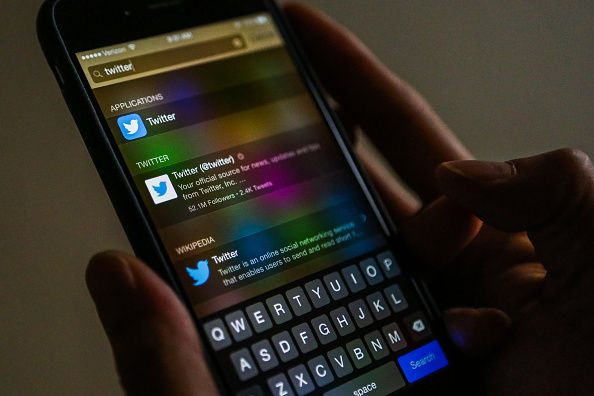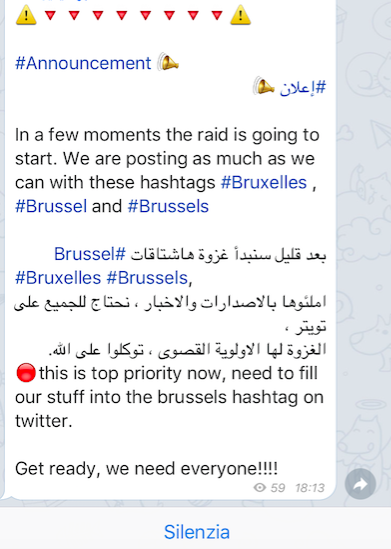#Brussels Hashtag Shows Difficulty In Combating Extremist Messages In Social Media

Hours after two bombings in Brussels claimed the lives of more than 30 people, a hashtag celebrating the attacks, "Brusselsisonfire," appeared on Twitter.
“You declared war against us and bombed us, and we attack you inside your homeland,” one tweet read. The hashtag was reportedly used by supporters of the Islamic State group to taunt their victims shortly after the attacks, the Jerusalem Post reported, but it was quickly shut down by Twitter, part of an extensive effort by U.S. social media companies to stop the use of their networks to spread messages of hate.
Facebook, Twitter and YouTube have all issued public commitments to combat extremism, and have worked for the past year to block posts that condone or encourage violence.
Twitter's work was given a spotlight in November after the Paris attacks, in which similar hashtags celebrating the atrocity were seen online. In February, Twitter publicly upped its commitment to blocking accounts in a blog post titled “Combating Violent Extremism” and announced it had increased the size of the teams who review reports. “We have already seen results, including an increase in account suspensions and this type of activity shifting off of Twitter,” the blog post reads.
In the hours following the attacks Tuesday, the hashtag #Brussels and other topics related to Belgium were trending on both Facebook and Twitter. Clicking on that topic could lead a Twitter user to see not only messages of condolence and outrage from world leaders and celebrities but also tweets supporting the violence. Those messages were in violation of Twitter's terms of service, which forbid directly or indirectly promoting violence. Some of those accounts were later suspended and tweets removed by Twitter, as seen by International Business Times through Dataminr, a third-party app for surfacing breaking tweets.
Yet it was clear on Tuesday that Twitter was having trouble keeping up. For instance, a tweet, translated from French to English, read “#URGENT/ Several bombs placed at the European Commission! Emergebcy evacuation or die! #Bruxelles #Zaventem.” That tweet was sent at 8:17 a.m. EDT and was live as late as noon. The account has since been suspended.
It's becoming increasingly difficult to tell which accounts and messages are associated with real terrorist groups or sympathizers.
“Today I think, in part [due] to social media, there’s a real cacophony of voices within terrorist groups. … The reliability of the terrorist messaging has declined as lower-level members can post online,” said Max Abrahms, a political science professor at Northeastern University in Boston and member of the Council on Foreign Relations.
At the same time, there has been a shift in the way the Islamic State has been using social media. Struggling on the battlefield more than ever, ISIS needs at least the impression of success. “The group has been struggling and increasingly in the stronghold … to a large extent this was a group that succeeded in recruiting by underscoring its success on the battlefield,” Abrahms said.
Clearly terrorists, including those with the Islamic State, are using social media to spread propaganda and messaging, yet Abrahms said social media has not been a big success for them. “It’s much more complex,” he said. “Certain types of propaganda actually hurts the group.”
Rather than censor all jihadist sympathizers, some believe the better strategy is to allow them to lose in the court of public opinion. In June, Google’s legal chief David Drummond told the Guardian that censorship is not the only answer and put forth that marketers and the social media public should share videos that combat ISIS propaganda.
“Enforced silence is not the answer. Drowning out the harmful ideology with better messages, with reasonable messages, is the better way,” Drummond told the Guardian.
Each terror attack, be it in San Bernardino, California, Paris or now Brussels, rekindles the same debate over the role of internet companies in policing their networks. Their positions fall on a spectrum between attempting to stop all violent conversations to allowing them to fail in the free marketplace of ideas. “We stand for freedom of expression, and people must feel safe in order to speak freely,” Twitter CEO Jack Dorsey wrote in a letter to shareholders last month for his company’s fourth-quarter earnings report.
The debate comes in the context of quickly escalating government requests for information, which Twitter and other internet companies disclose in their transparency reports. Twitter received 5,560 reports for requests of information in July to December 2015, up 93 percent year over year. Twitter declined to comment for this story.
Meanwhile, Congress is getting involved with the Combat Terrorist Use of Social Media Act of 2015, which passed the House in December and is in the Senate Committee on Foreign Affairs.
The bill, introduced by Rep. Ted Poe, R-Texas, calls for President Barack Obama to provide Congress with a report on the administration's strategy to combat terrorists' use of social media.
"The problem is now you have different government agences and companies all interpreting what they think should come down on the site, interpreting what is giving aid to a foreign terrorist organization. We need a uniform definition and then a protocol that we want developed," Poe told International Business Times.
On Feb. 10, the Senate passed its version of the bill, the Combat Terrorist Use of Social Media Act of 2016, and it was ordered to be reported with an amendment.
Beyond Poe's bill, on Monday, the House issued a motion to reconsider the Integrated Public Alert and Warning System Modernization Act of 2015, which requires government agencies to incorporate technologies in their public communications. Technologies could imply social media.
Additionally, the massive planning for disseminating news and propaganda fast and to thousands of people often happens off Twitter or Facebook and instead on private, encrypted channels like Telegram.
ISIS supporters have also been extremely active on Telegram, an encrypted messaging application, sharing news updates from the group’s operations and celebrating their exploits. Some of the more popular accounts share upwards of 400 posts a day, IBT has seen. In the hours following the attacks in Brussels, dozens of ISIS-affiliated Telegram channels shared hundreds of messages about the operations to their followers, with some accounts having up to 5,000 members.
On Tuesday evening, one of ISIS’ official media wings released a statement claiming responsibility for the triple bombing. ISIS Telegram channels shared the statement, some translating it from Arabic to other languages in order to reach a larger audience.
Minutes after disseminating the claim of responsibility, several ISIS Telegram channels issued an urgent warning to their members: Their social media manpower was needed. ISIS supporters feared that tech companies, Twitter in particular, would begin what they described as a “raid” on their accounts, shutting down their propaganda-dissemination platforms.
ISIS supporters on Telegram were told to use their Twitter accounts to post as many tweets as possible using several trending hashtags connected to the Brussels attack:

But while social media can be hotbed for terrorist propaganda and hateful messages, the tools have also shown their worth for connecting people in times of crisis. For example, Twitter users in Belgium tweeted the hashtag #OpenHouse and #IkWilHelpen to invite people into their homes, BuzzFeed News reported.
Facebook launched Safety Check, its tool that lets Facebook users in an area struck by disaster mark themselves as safe and notify their friends of their status, in Brussels. That system was previously used for natural disasters until the Paris attacks. The decision initially garnered criticism for Facebook prioritizing terror attacks in the West. In recent months, Facebook has activated Safety Check for terrorist attacks in Yola, Nigeria, and Ankara, Turkey, and also turned on the tool for floods in Chennai, India, and earthquakes in northeast India and southern Taiwan.
"Safety Check is a simple and easy way to say you’re safe and check on others after a major disaster or crisis. In 2015, more than 950 million people received a notification that a friend or loved one was safe in a crisis," a Facebook representative told IBT.
Evidently, that does not include every crisis. "We are learning to make the tool and policies behind it better as we go, and because Safety Check is a relatively new feature for us, we're still understanding how it can best be used and in what instances," Alex Schultz, Facebook's vice president of growth, wrote on Facebook days after the attacks in Paris.
With or without Safety Check, social media users can share and spread their support and solidarity with Brussels:
The #BrusselsAttacks only unite humanity—they will not tear us down. The world stands with #Brussels & we'll move toward a brighter future.
— Jim Yong Kim (@JimKim_WBG) March 22, 2016
Thoughts are with all in #Brussels, including those injured and killed, and first responders and security working to keep Brussels safe.
— John Kerry (@JohnKerry) March 22, 2016
The horrible attacks on #Brussels affect us all. My heart is with you #Brussels __ pic.twitter.com/3DNTQWAFg2
— Eva Longoria (@EvaLongoria) March 22, 2016
Alessandria Masi contributed to this report from Beirut.
© Copyright IBTimes 2024. All rights reserved.






















